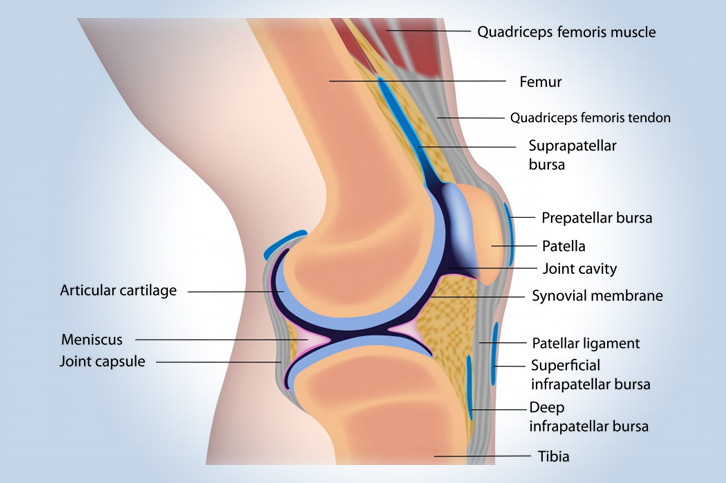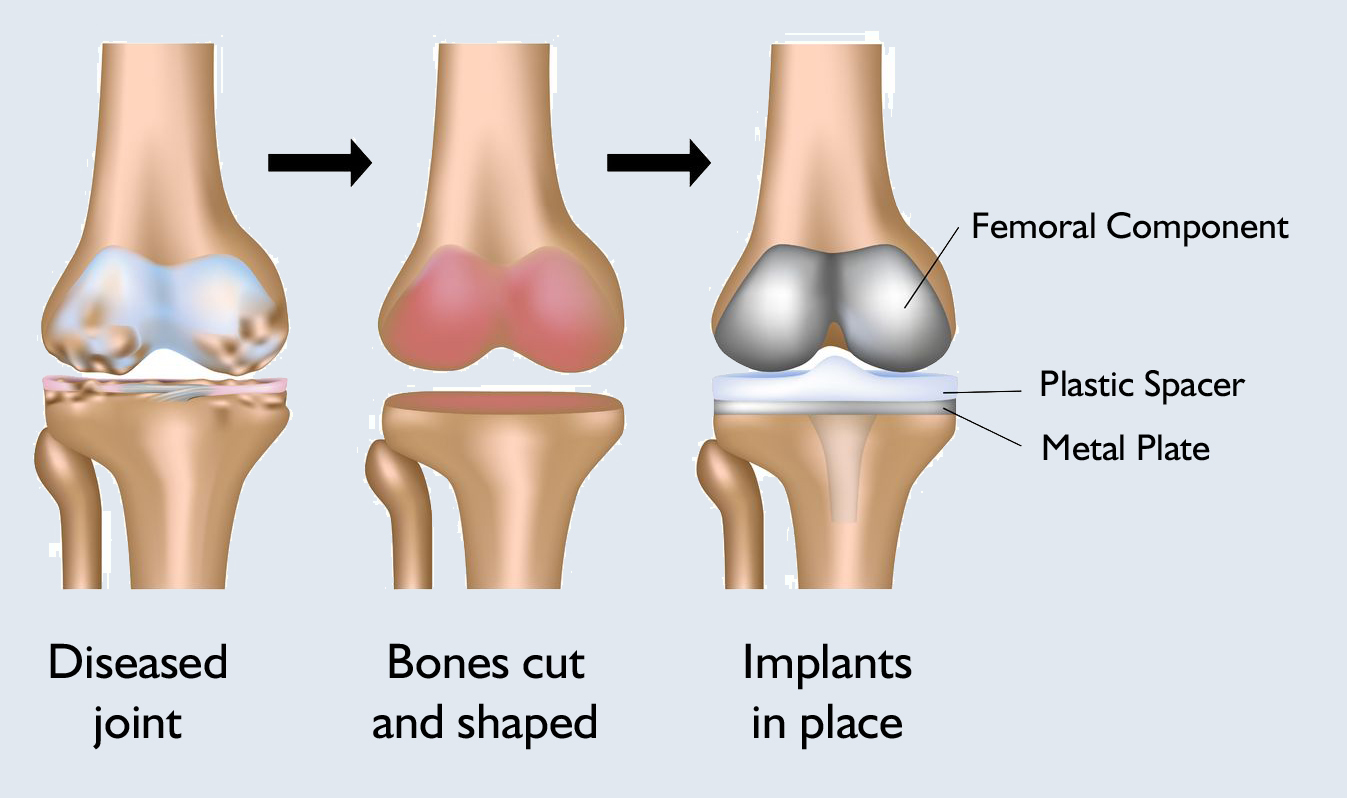Total knee replacement
Since we use our knee every day, almost every minute, it is at risk of wear and accidents. If your knees are so worn out or you have an accident so severe that the damage is irreversible, in many cases only implanting a full knee replacement can help.
Why choose Medicover for knee replacement surgery?
- Immediate knee replacement surgery: If your health condition is deemed suitable for prosthesis implantation during the examination, we can perform the surgery without waiting.
- Well-integrated, experienced orthopaedic surgical team: Our orthopaedic surgeons were trained in renowned foreign and domestic prosthesis centres, with hundreds of prosthesis surgeries behind them, therefore you are in the best possible hands.
- Our surgeons assist each other during prosthesis surgeries, so not only the operating physician, but also the assistant is an experienced orthopaedic surgeon. What does this mean for you? Greater safety, faster surgery, fewer complications.
- Internationally proven prosthesis systems: The prosthesis systems we use are proven in many Western countries, implanted a million times, and ensure long-term prosthesis survival.
- Affordable prices, convenience services: We perform our prosthetic surgeries at affordable prices. Our clients are accommodated in modern, pleasant, air-conditioned single rooms. Each room has its own bathroom, refrigerator and television, and free WIFI access is also available. We also provide our clients with individual nurse supervision, who will help you with your ongoing recovery during your stay.
- The complex anaesthesia procedures included in the price ensure that you have as little postoperative pain as possible.
- Our anaesthesiologist specialists are also available during on-call hours, who can provide immediate professional care in the event of a problem.
- During your hospital stay, our physiotherapist will regularly, even several times a day, promote your speedy recovery, which is included in the price.
- The first check-up after surgery is free, and we also offer a significant discount on the second and third check-ups.
What is the knee joint and what are its parts?
The knee is the largest and most complex joint in our body, which performs rolling and rotational movements of moderate degree during operation. It plays an essential role in movement when carrying weight in the horizontal (running and walking) and vertical (jumping) directions.
It actually consists of two real (femur and tibia, femur and kneecap) and one non-real joint (the end of the tibia and fibula near the knee). The meniscus (C-shaped elastic fibrous cartilage) is located between the articular surfaces (hard hyaline cartilage) of the femur and tibia, which reduces the shape difference of continuously changing surfaces during movement due to their elastic properties.

When is knee replacement surgery needed?
- Degenerative changes due to wear (in old age)
- Arthritis, alone or as part of rheumatoid arthritis
- Axial abnormalities (X-feet, O-feet), cartilage damage caused by frequent kneecap sprains
- Knee changes (instability, joint fractures, etc.) as a result of accident
Based on these, if, despite conservative treatment, walking causes pain in everyday life, or you can no longer sleep through the night because of pain, an orthopaedic specialist examination is needed, based on which your treating physician can decide what surgical treatment you may need, which may include the implantation of a knee prosthesis.
Which knee replacement surgery do we perform?
In our hospital, we perform primary total knee replacement surgery based on indication confirmed by preliminary examinations. During this process, our knee specialist orthopaedic surgeons replace the worn joint surfaces of the knee with an artificial prosthesis. This allows almost complete original stable movement of the knee.
How is knee replacement surgery performed?
At our hospital, the procedure is performed under regional (i.e. spinal) or general anaesthesia. The type of anaesthesia is decided by your doctor depending on your medical condition.
Knee replacement surgery is performed with a special bleeding cuff placed on the thigh to minimize blood loss. After proper anaesthesia, an approximately 20-centimeter incision is made above the kneecap, through which the surgeon exposes the joint. Worn cartilage surfaces are removed and templates are used to create the location of the knee prosthesis.
By inserting a test prosthesis, we check the stability and the range of motion.
Metal components of a predetermined size are glued with special antibiotic bone cement, between which a plastic lining is inserted to ensure proper movement and friction. Depending on the condition of the kneecap, a plastic “button” may also be used to replace the articular surface of the kneecap. If the movement and stability of the final components are adequate, thorough haemostasis is performed and then the tissues are layered over a drain tube to remove any haematoma that may form. A sterile dressing and elastic bandage are then applied.

What preparations are needed before the surgery?
To select the right knee prosthesis, functional X-rays, and in some cases CT scans, are required.
There is a risk of infection during knee replacement surgery, so a fuller examination is needed to prevent this:
- In addition to routine laboratory tests, pharyngeal and urine cultures are required prior to surgery.
- After the most careful haemostasis following surgery, blood transfusions may be necessary, so a blood type test and antibody screening is performed, based on which we always provide blood products for knee replacement surgery in our hospital, so that it could be available if needed.
What to do after knee replacement surgery?
One of the most important parts of postoperative knee replacement surgery is rehabilitation and early functional treatment of the knee.
To do this, it is extremely important to reduce postoperative pain, which is performed in the immediate postoperative period with a so-called EDA (EpiDural Anesthesia) cannula, which can be used to significantly reduce pain with an aesthetic placed in the epidural space.
Additionally, on the day after the knee replacement surgery, the drain is removed and physiotherapy treatment begins, which includes exercises that relieve the knee, assistive device mobilization, and CPM treatment, i.e. machine-controlled passive movement of the knee.

This happens every day of the postoperative period, and after 3-4 days you can leave our hospital and continue rehabilitation at home, with a complete physiotherapy program. Learning and doing gymnastic exercises regularly is very important to achieve painless movements as soon as possible.
It is extremely important for a good end result that you work properly with your physiotherapist, start and do physiotherapy on time to avoid joint mobility limitations and other problems.
What are the benefits of implanting a knee prosthesis?
- As a result knee replacement, your pain is expected to ease or even completely eliminated.
- The movement of the joint (in addition to the regular specific physiotherapy after the surgery) is significantly improved, the previous possible limping gait is eliminated.
- In this way, those who have undergone surgery can live a fuller life again, play sports with certain restrictions, thus live a healthier life, and also leave the painkillers they take regularly.
What are the risks of the intervention?
All interventions thus knee replacement surgery also involve risks. Despite the most careful examination, unexpected complications may occur. Therefore, an extremely thorough examination is necessary, during which we recommend postponing the operation in all cases that would put you at increased risk.
- The greatest risk is a wound infection, which can be mild (redness, wound healing disorder, etc.) as well as a severe, deep infection of the bone tissue. Diabetics, overweight patients, those on steroid treatment are at particular risk.
- Thrombosis (abnormal blood clots) can also occur, which can be associated with any surgery. Patients with varicose veins of the lower extremities and those who have previously undergone thrombosis or obese patients are particularly exposed to risk. To avoid this, we will give you anticoagulant injections for about six weeks, which will minimize the likelihood of developing thrombosis.
- Fractures of the affected bones may occur during or after knee replacement surgery. In this case, it may be necessary to extend the operation, to insert suitable new metal materials (implants), and to walk straining the leg only later than planned. The risk of this complication is especially possible in case of patients with osteoporosis.
- Blood vessels and nerves run in the area to be operated on, so very rarely, but damage to these formulas can also occur.
- After the implantation of a knee prosthesis, there may be a degree of haematoma that needs to be emptied with another surgery to prevent later infection. Therefore, blood transfusions may be necessary.
Am I suitable for knee replacement surgery?
In each case, your doctor will decide, based on preliminary tests, what the risks are. An anaesthesiologist is also consulted to determine the risk more accurately. The results of the tests and consultation with the anaesthesiologist are crucial.
Convenience services
We accommodate our clients in a modern, pleasant, air-conditioned single room. Each room has a private bathroom, fridge and TV, and free WIFI access. We also provide our clients with individual nurse supervision, who will help your continuous recovery during your stay along with the regular physiotherapy sessions.
What is included in the price of our surgeries?
- costs of the surgery
- costs of anesthesia (local or general anesthesia, postoperative pain relief)
- the costs of the planned hospital stay and care
- necessary medicines and certain medical aids during the stay
- inpatient physiotherapy treatment (if necessary for rehabilitation)
- if necessary, the fee for the planned histological examination
- the price of the first follow-up examination
What additional costs might be expected?
- implants
- consultation with the anesthesiologist (must be done in Medicover)
- pre-operative examinations (if performed by us)
- in case of blood group antibody positivity, the blood matching fee
- hotel service fee for extra care days
- aids for further rehabilitation
- accompanying person staying in the hospital
- day (with one meal) 20 000 HUF
- night (full board) 60 000 HUF
- furthermore, if necessary, the cost of the 2nd follow-up examination is the fee of the specialist examination -50%, the cost of the 3rd follow-up examination is the fee of the specialist examination -30%
The course of the surgery
Before surgery
- pre-surgery specialist consultation, where the specific surgical proposal is made
- consultation with the Case Manager
- general information if necessary
- preparation of a written quotation
- booking surgery and preliminary examination appointments
- payment
-
carrying out pre-operative examinations
-
arrival for surgery
On the day of surgery
- arrival at Medicover Hospital at 6:30
- check-in at the reception on the ground floor
- occupying a room accompanied by a nurse, who provides information
- morning visit with the specialist physician and anesthesiologist
- surgery
- postoperative monitoring
- afternoon visit with the specialist physician
- constant anesthesiology specialist monitoring in the postoperative period
- discharge (with an accompanying person), final report and handing over a certificate
Surgical service process
- surgery
- hospital stay and care
- planned histology
- follow-up examination, sutur removal
